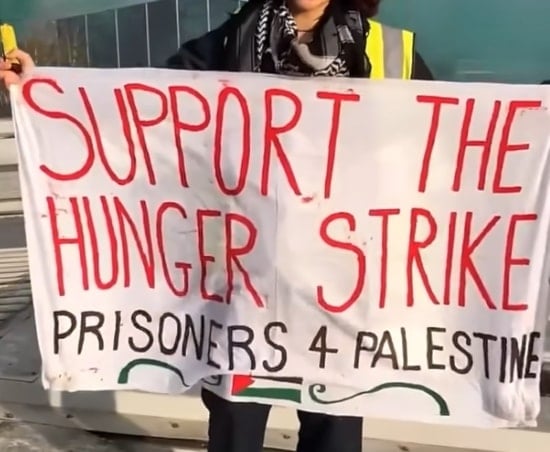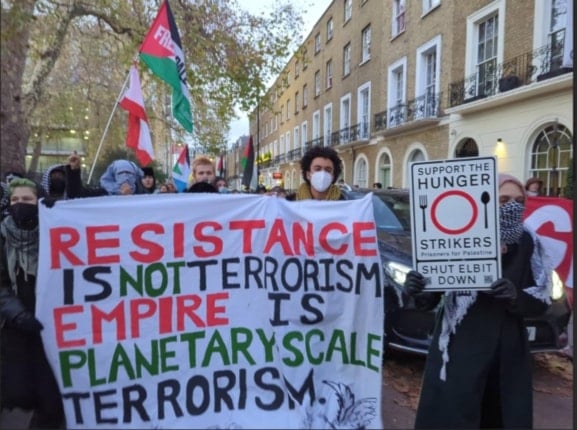Activist and hunger striker Kamran Ahmed hospitalised
In this report, Sul Nowroz documents the critical hospitalisation of UK hunger-striker Kamran Ahmed, exposing medical negligence, excessive "counter-terrorism" powers, and the growing movement demanding justice for political prisoners held without trial.
-

At the time of publication, Ahmed remains hospitalised with no word to his family about his condition. (Al Mayadeen English; Illustrated by Batoul Chamas)
An activist held on remand for over a year while awaiting trial was rushed to the hospital this morning in the UK after his health rapidly deteriorated during a hunger strike, raising urgent questions about the treatment of political prisoners and the use of counter-terrorism legislation against anti-war protestors.
Kamran Ahmed, 29, who has been held on remand at Pentonville prison since November 2023, collapsed on Friday with dangerously low blood sugar levels. He was hospitalised on Tuesday morning, becoming the first of six hunger-striking prisoners to require emergency medical intervention. His family has received no further updates since his admission.
The arrest and charges
Ahmed was arrested during a violent dawn raid in November 2023, accused of involvement in an intervention at an arms facility in Filton, Bristol. The facility is owned by Elbit Systems, “Israel's” largest weapons manufacturer. During the direct action, quadcopter drones were dismantled by activists.
24 people were ultimately rounded up in connection with the action, arrested under counter-terrorism legislation despite not being charged with any terrorist offence. All were remanded in custody, a decision that drew criticism from human rights organisations and sparked debate about the appropriate use of anti-terrorism powers.
The legal battle
Ahmed's case has taken numerous turns through the courts. Despite being the sole carer for his elderly parents, he has been repeatedly denied bail. The first of the so-called Filton 24 went on trial this week, while others, including Ahmed, face waits until next summer or later before their cases are heard.
In a brief moment of hope on February 28, 2025, Mrs Justice Cheema-Grubb granted Ahmed bail at the Old Bailey. However, just days later on March 4, a judge at the Court of Appeal overturned this decision, denying him bail once again. Ahmed now faces the prospect of spending up to two years on remand for allegedly dismantling weapons being used in what many international observers describe as an active genocide.
CAGE International described the case as "an egregious assault on campaigners that marks a significant escalation by the state in defence of Israel." The organisation noted that despite the activists' actions not meeting the threshold for terrorism offences, authorities are seeking to impose harsher terror-related sentences through what they call 'back door legal provisions.'
The hunger strike
On November 10, Ahmed joined the Prisoners for Palestine hunger strike, becoming the sixth prisoner refusing food. Ahmed stated his hunger strike was intended to align with demands sent to the Home Office and to show solidarity with those ‘having a harder time on remand’ than himself. He drew parallels with Palestinian political prisoners, citing the case of Siham Abu Salem, a 71-year-old woman who was detained from her hospital bed and declared an unlawful combatant, held for two years before her recent release.
"I hope my hunger strike acts as a symbol for people in the future, so they remain undeterred in standing up for what's right," Ahmed said.
The physical toll and medical crisis
The effects of Ahmed's hunger strike have been severe and rapid. An asthmatic, he has suffered from dizziness, breathing difficulties, and chest pains, compounded by low blood sugar and dangerously high ketone levels. Before joining the hunger protest, Ahmed, who stands nearly six feet tall, weighed 74kg. When last weighed, this had dropped to just 68kg: a loss of six kilograms in a matter of weeks.
Ahmed's health deteriorated rapidly from November 21, when he first collapsed. Two days later, on November 23, his blood sugar had plummeted to a dangerously low level of 3.2 mmol/L, well below the normal range of 4.0-5.9 mmol/L and indicating severe hypoglycaemia. At this critically low level, the brain is starved of glucose, its primary fuel source, leading to confusion, loss of consciousness, seizures, and potentially death.
The prison administration called an ambulance in response to Ahmed’s medical emergency. However, in a shocking decision, the paramedics refused to take Ahmed to the hospital. They claimed there was nothing they could do for him while he continued to refuse food, a response that medical experts say demonstrates a fundamental misunderstanding of the duty of care owed to prisoners, and the medical interventions available for treating hypoglycaemia and starvation complications.
In what campaigners describe as a blatant violation of their duty of care, on the same day the paramedics refused to transport Ahmed, prison guards placed food into his cell. This action ignored the prison's own medical guidance on refeeding syndrome, a potentially fatal condition that occurs when nutrition is reintroduced too quickly to a starving body. The seemingly simple act of providing food to someone in Ahmed's condition, without proper medical supervision and a carefully calibrated refeeding protocol, could trigger fatal cardiac arrhythmias, respiratory failure, or seizures.
The body's breakdown during starvation
During a hunger strike, the body undergoes a cascade of physiological changes as it attempts to survive without food. In the first 24-72 hours, the body depletes its glucose reserves and begins breaking down glycogen stores in the liver and muscles. After these are exhausted, typically within three days, the body enters a state called ketosis.
In ketosis, the body begins to break down fat stores for energy, producing ketone bodies that can be used by the brain and other organs. While this provides a temporary energy source, high ketone levels, such as those Ahmed experienced, can lead to disorientation, rapid breathing, and eventually loss of consciousness.
Family speaks out
Ahmed's sister, Shamina Amal, who organised a protest march from Pentonville Prison to the Ministry of Justice on Tuesday afternoon, expressed her anguish and frustration:
"All of this could have been avoided if the government would have engaged in conversations about the demands, which they are yet to respond to. I am disgusted that the government has chosen to ignore the hunger strikers with no care or consideration to their sanctity of their health and lives."
Growing support and concern
Despite short notice, scores of protesters supported Tuesday's heavily policed march through central London, carrying banners reading ‘Drop The Charges’ and ‘Resistance Is Not Terrorism.’ Local people came out to show their support along the route. According to witnesses, the policing was heavy-handed, with several marchers arrested, including an elderly woman on crutches who was reportedly tackled to the ground by police.
In response to the treatment of the hunger strikers, a letter signed by over 100 medical doctors has been sent to the Health and Justice Commissioning NHS Team, expressing growing concern over how the prisoners are being handled. The letter highlights what medical professionals describe as medical negligence throughout the hunger protest, including the refusal of paramedics to transport Ahmed to hospital and the dangerous manner in which food was provided without proper medical protocols.
Support for the prisoners continues to grow despite government indifference. Numerous groups and organisations have pledged support, including Defend Our Juries, Campaign Against The Arms Trade, CAGE International, and Black Lives Matter UK. Solidarity protests have taken place outside prisons holding the hunger strikers, and political prisoners overseas have taken solidarity action. MPs Jeremy Corbyn and Zarah Sultana have sent letters to the government regarding the situation.
Prisoners for Palestine designated Tuesday as an International Day of Action, coordinating support efforts globally.
Francesca Nadin, speaking on behalf of Prisoners for Palestine, said:
"Today, 23 days since the Prisoners for Palestine hunger strike began, and more than 5 weeks since the British government received notice, Kamran Ahmed became the first of the prisoners to be hospitalised. The callous disregard of the prison authorities, for the health and well-being of the prisoners in their care, has matched that of the British state, with medical negligence being consistent throughout the hunger protest. To avoid further harm to the quickly deteriorating health of the hunger-strikers, it is imperative that the government addresses the prisoners demands, and engages with them, to bring the protest to an end."
At the time of publication, Ahmed remains hospitalised with no word to his family about his condition.
The question now is whether the British state will continue its policy of silence, or whether the hospitalisation of a prisoner held for over a year without trial, and the medical negligence that preceded it, will finally prompt a response to the demands of the Prisoners for Palestine.

 Sul Nowroz
Sul Nowroz
 8 Min Read
8 Min Read














